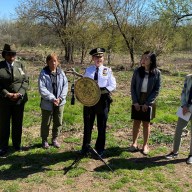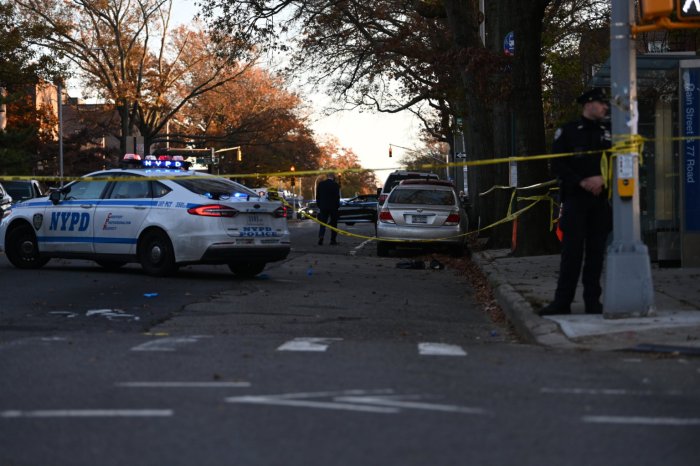By Courtney Dentch
Members of the Northeast Queens Jewish Community Council were urged to report any possible hate crimes to the police and to develop an emergency plan for their synagogues and community centers to prepare for attacks, fires or natural disasters.
The advice came from law enforcement and emergency preparedness experts who spoke at the council's community forum on Hate Crimes, Security Issues and Emergency Planning Sunday morning at the Torah Center of Hillcrest.
The forum was held after a series of bias attacks in the Fresh Meadows area in mid-April, around the Jewish holidays of Passover and Yom Hashoah, or Holocaust Remembrance Day. In two incidents, anti-Semitic graffiti appeared in the Jewish community near 164th Street and 69th Avenue, with a swastika found on a garage door and others drawn on parked cars, said City Councilman Jim Gennaro (D-Fresh Meadows).
“The Jewish community has been a community of late that has seen hate crimes and acts of anti-Semitism perpetrated,” he said. “We need to make sure we're fighting hate and combating those who would sabotage our freedoms and safety.”
Assistant District Attorney George Ferrugia, from the Bias Crimes Bureau, explained that when investigators learn that a crime may have been motivated by prejudice, his office is notified at the same times as the NYPD's Hate Crimes Task Force.
“It's important for victims to speak up about it,” he said. “Once we learn there is a hate crime component, we take it into the anti-bias bureau.”
Hateful graffiti, such as swastikas, is usually done by emotionally disturbed people, or by young people who may not realize the pain the graffiti may inflict, said Sgt. Connie Magus, of the task force.
“The kids may know it's a Jewish community, so they put a swastika, not knowing the damage that can be done,” she said. “Most of these kids know it's bad to write on the walls, but they have no clue about the damage it does to the community they hurt.”
One way to fight that ignorance is for the Jewish community to stand up when other groups are attacked, U.S. Rep. Anthony Weiner (D-Forest Hills) said.
“When we hear about a swastika on someone's car, our stomachs sink,” he said. “When we see an act of hate against other people, when we see someone held at knifepoint because they are Sikh, or we hear about people going into a corner bodega owned by Arabs and shooting them, we should also feel that same sense.”
The forum also dealt with more general emergency preparedness, specifically developing evacuation plans for community institutions.
David Pollack, associate executive director of the Jewish Community relations Council of New York and co-author of “Emergency Planning: Crisis and Disaster Systems for Jewish Organizations,” recommended that synagogues and community centers form a plan to clear the building and educate staff on all possible exits in case the main doors are blocked.
“Ninety-eight percent of the time, if someone hears a fire alarm, they want to leave the same way they came in,” Pollack said. “Synagogues should have fire drills at least for the ushers, so they know what to do.”
Staff members should also be assigned specific tasks in case of an emergency, such as checking that stairways and rooms are empty, and grabbing the “go-binder,” a book Pollack said should contain phone numbers for all employees. It should also contain information on any children in the building, parents, a floor plan, and an attendance list of people in the building. Institutions should also form mutual aid agreements, so people have a place to go to use the phone during the emergency, he said.
“The most important thing you can do for your clientele is to ensure them that you're keeping them safe, that their children are safe,” he said.
But Weiner cautioned against over-preparedness, which could alarm children within the synagogue community.
“There is a line we have to be careful not to cross, and that line is from being prepared to being anxious,” he said. “A child can sense when their parents and the leaders of a community are walking on eggshells.”
Reach reporter Courtney Dentch by e-mail at TimesLedger@aol.com, or by phone at 718-229-0300, Ext. 138.





























